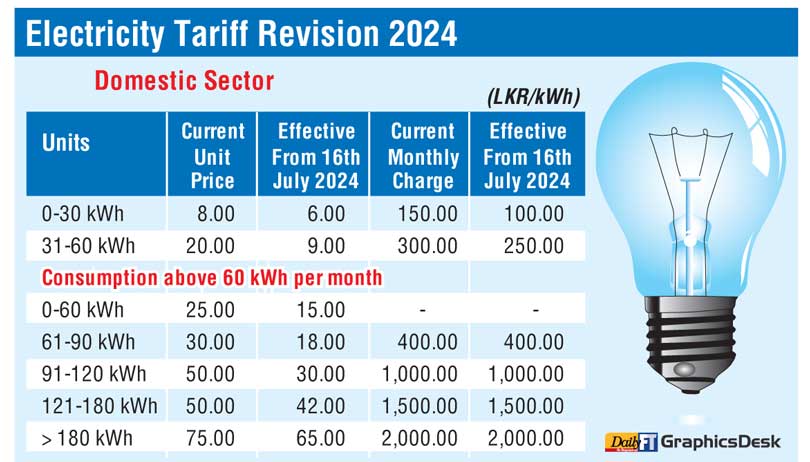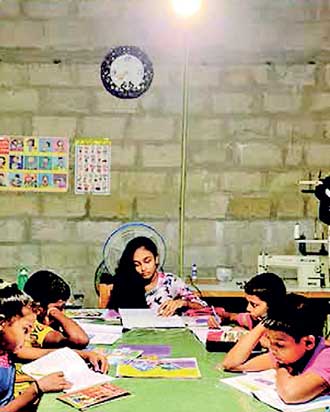Thursday Feb 19, 2026
Thursday Feb 19, 2026
Tuesday, 16 July 2024 01:28 - - {{hitsCtrl.values.hits}}

 The Public Utilities Comm-ission of Sri Lanka (PUCSL) yesterday approved a sharp 22.5% downward revision of electricity tariffs effective from today.
The Public Utilities Comm-ission of Sri Lanka (PUCSL) yesterday approved a sharp 22.5% downward revision of electricity tariffs effective from today.
“Considering the detailed review of the Ceylon Electricity Board’s (CEB) proposal for the second tariff revision of the year, concerns raised by the stakeholders electricity tariffs during public consultations were further revised incorporating both subsidies, cross-subsidies and generation mix to an average reduction of 22.5%,” PUCSL Chairman Prof. Mohan Fernando said, noting that it is the last tariff revision under the current committee.The new tariff structure will benefit a wide range of electricity users, including domestic users, religious institutions, hotels, industries, public utilities and Government entities.
Although the CEB had suggested an overall reduction of 10%, the PUCSL opted for a more substantial cut, lowering tariffs by 22.5%.
For domestic consumers, the revised tariffs are as: below 30 units – reduced from Rs. 8 to Rs. 6; units 31-60 reduced from Rs. 20 to Rs. 9; units 0-60 reduced from Rs. 25 to Rs. 15; units 61-90 reduced from Rs. 30 to Rs. 18; units 91-120 reduced from Rs. 50 to Rs. 30; units 121-180 reduced from Rs. 50 to Rs. 42 and over 180 units reduced from Rs. 75 to Rs. 65.
More...
“Domestic electricity users below 30 units, which accounts to 1.5 million or 26% of total electricity users will see a reduction of 27% in their monthly bill from Rs. 390 to Rs. 280. Electricity users utilising 31-60 units accounting to 53% or 3.4 million will see their monthly bill coming down by 55% from Rs. 1,140 to Rs. 700,” he explained.
In addition, Prof. Fernando said the domestic electricity users utilising 120 units, 150 units and 180 units will see a reduction in their monthly bill by Rs. 1,500, Rs. 1,800 and Rs. 2,000 respectively.
In the industrial and hotels categories, the daytime tariff has been reduced by 33%, with Micro, Small and Medium Enterprises (MSMEs) seeing similar reductions.
“One of the main concerns at the public hearing was to give some benefit to hotels and MSMEs,” Fernando said.
Hotels and industrial sectors see an overall reduction of 25%, whilst religious places and charities electricity tariff have seen a reduction of 30%.
Religious places will see reductions across various usage levels. Unit price of Rs. 8 reduced to Rs. 6; Unit price of Rs. 18 reduced to Rs. 10; unit price of Rs. 32 reduced to Rs. 20 and unit price of Rs. 43 reduced to Rs. 30.
Fixed monthly fees for religious places have also been lowered for all categories.
For factories and hotels with a contract demand of less than 42,000 volts, the unit prices have been revised. The rates at Rs. 37, Rs. 30.50 and Rs. 25.50 were reduced to Rs. 30.50 and Rs. 18 respectively.
Government institutions and general-purpose departments will also benefit from reduced rates. Accordingly, Rs. 55 reduced to Rs. 46.75; Rs. 45 reduced to Rs. 38.25 and Rs. 37 reduced to Rs. 31.45.
In addition to the new tariffs, the PUCSL has imposed seven conditions on the CEB. These include a mandate for the issuance of printed electricity bills upon request by consumers and the requirement for the CEB to enter into agreements with the Ceylon Petroleum Corporation (CPC) for fuel purchases essential for electricity generation.
Prof. Fernando said the MSMEs who complaint of no subsidised electricity is because they have not provided proof of registration as micro or SME to relevant authorities. “To avail the concessionary rate, the MSMEs must be registered in Provincial Councils or any relevant organisation,” he added.
